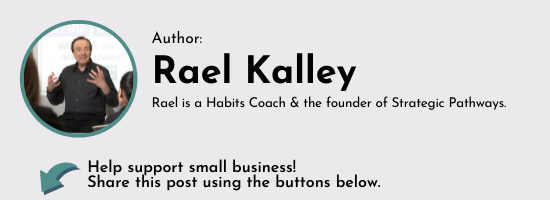The Formula of Changing Habits
Habits change. But only you want them to. Today we look at the next step in the formula for making habits change: replacement.
I constantly see examples of the things people do repeatedly that bring them stress, frustration and hardship and then, like the movie Groundhog Day, get up the next morning and do it all over again.
Much of the corporate work I do is around working with, and training managers to do the one thing they are expected to do – engage with and optimize the performance of each direct report.
I often joke with managers, telling them that their job comprises nothing more than manipulating performance.
As crass as that sounds, managers are measured by both the individual and collective results delivered by those who report to them. What I find fascinating is that the difference between the truly successful managers and those who struggle comes down to one thing: the habits they have adopted with respect to how they interact with their staff.
Being creatures of habit, we humans tend to do the same things repeatedly, even when those very same things consistently produce the very results we say we don’t want.
The aphorism, “The definition of insanity is doing the same thing over and over again and expecting a different result” has been attributed variously to Albert Einstein, Ben Franklin and Mark Twain. While it isn’t clear who exactly coined the phrase, it certainly it true.
Habits Rule All
There is not a single facet of our lives not governed by the habits we have adopted. When we set out to make a change, we tend to focus on the new behaviours we intend to adopt which we believe will produce the new results we desire. I suggest we would all be better off if, before we gave any thought to determining what those habits should be, we took the time for deep introspection and sought to discover the habits we have acquired which are producing the present results – the ones we wish to change. (continued below)
Upcoming Seminar:
The desire to lose weight and keep it off is a habit I help many clients with, and on Saturday, October 28th, I am conducting a 1-day workshop on this called Permanent Weight Loss.
This will be a high-energy informative day focusing intently on the mindset of losing weight and keeping it off. Participants will leave with a personalized, detailed plan for success.
The price includes a private coaching session with me and a 1-on-1 session with a Registered Dietician.
Click here to learn more
We can’t get rid of habits, we can only replace our existing ones with new ones. This means, to do this successfully we need to have very clear recognition of those old habits.
I was recently asked to work with a manager who professed she was struggling with several direct reports. Initially, she had contacted me to work with them, her belief being that they were the cause of the strife between them and if they could just be fixed, all problems would dwindle away.
As I spent time with her I noticed one of her habits that she trotted out many times each day; she constantly interrupted others while they were speaking. Not only did she do this with her direct reports, but I also observed her interrupting both her peers and her boss. Definitely not a career enhancing move.
She asked me to meet with each of staff and listen to their views of her as a manager.
I did as requested and, interestingly, the number one criticism levelled at her was that she did not listen. More importantly, each of her staff members interpreted this constant interruption to mean she had no interest in what they were saying.
The Formula of Changing Habits
When I presented this back, her first reaction was denial and, then, upon reflection, surprise.
She agreed to allow me to shadow her for several days and bring to her attention each time I noticed her interrupting others.
After just one morning, the evidence was overwhelming so we began the to discuss how to develop a new habit to replace this one. When she felt the urge to begin to interrupt and explain, she would instead use that as her cue to focus on what the other person was saying.
To her credit she worked incredibly hard to replace the old habit of interrupting, with a new one of attentiveness and listening.
Several months later I was invited back to re-interview her staff. The results were remarkable. Those who had been her biggest critics when now her strongest supporters.
And this newfound support translated to measurably improved results.
We are not the only ones who are impacted when our habits change, it is also the quality of life of those we interact with.
And this is exactly how we put our best foot forward every day.
Let’s make a habit of meeting like this.


